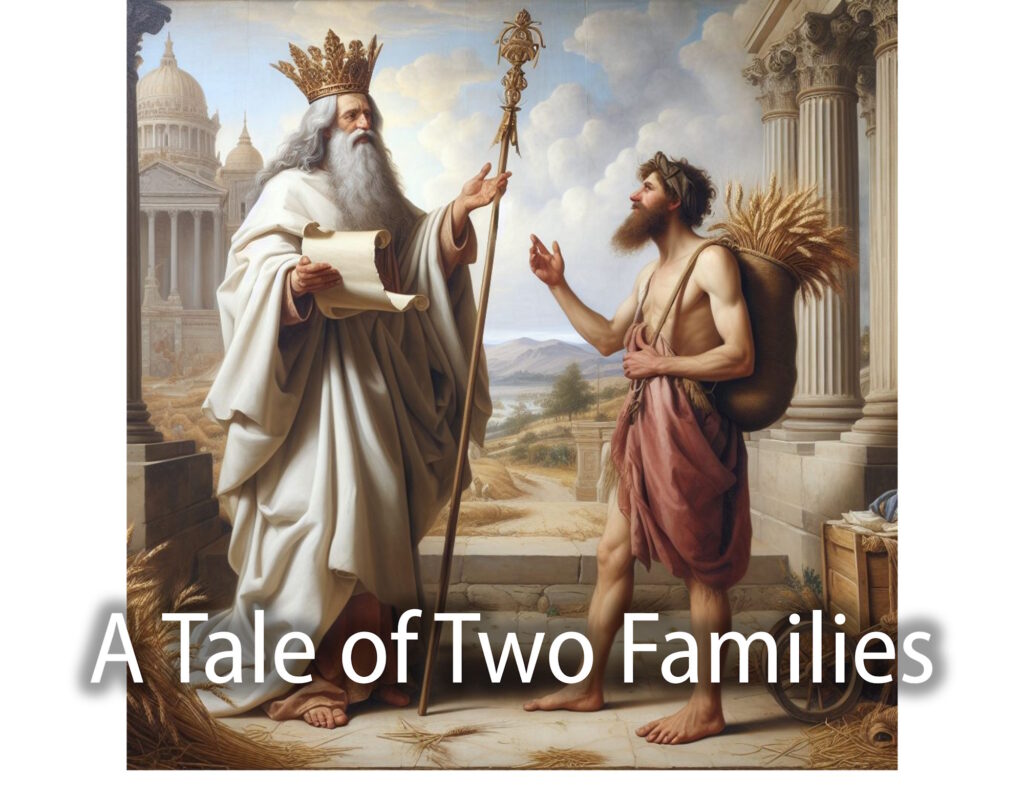Hespeler, January 7, 2024 © Scott McAndless – Baptism of the Lord
Genesis 1:1-5, Psalm 29, Luke 2:22-40, Mark 1:4-11
Last week, on New Years Eve, I decided to preach on the gospel passage from the lectionary for the day – the story of Mary and Joseph and the month-old Jesus in the temple. But, if you were here last week or if you have listened to the sermon since, you will know that I really didn’t get very far into the story at all. In fact, I didn’t even get past the first three verses.
That is okay as far as I am concerned. When God is speaking to you through even just a few words of scripture, I think it is always wise just to stop and stay with those words for a while so that you make sure you don’t miss anything that God might have to say.
The Rest of the Story
But none of that is to suggest that the rest of the story – the part after the first three verses – isn’t important. After they had gone to the priest and made a sacrifice of two turtle doves, Mary and Joseph turned around and went back out into the large open space that was known as the Court of the Gentiles.
I want you to try to imagine the space. On any given day, you would expect to find it just packed with people. Many had come, of course, to carry out the prescribed sacrifices and religious observances. But that was hardly the only reason why they came.
Many were seeking for God in some way and instinctively knew that this was the place where they might find God or hear God’s word. In the porches you could hear poets, prophets and philosophers giving their public speeches to the curious crowds. Scribes would also be teaching about the law and its application. And the people gathered around eagerly hoping to learn and grow. But people also sought to hear from God in a more direct way.
One Man’s Quest
Take, for example, that man over there. He does not come all the time to the temple like some do, but when he got up this morning he just felt as if he had to be here. He was a man who was deeply troubled by the state of his nation. He felt as if it had lost track of what it was supposed to be. And now, because of its failures, the nation was occupied by foreign invaders.
And so, he had implored God to console the nation and to send God’s anointed one who would lead it into liberty and hope for the future. And after praying for this hope for a very long time, he had become convinced that God had heard his prayer. He would see the Messiah that he longed for before he died.
Such a Long Wait
Oh, but the wait had been so long. And now he was getting very old, and he had begun to fear that he would not live to see it all come to pass. But today, when he rose, he was filled with this overwhelming sense that, if he came to the temple, God would show him something. God would give him hope.
So that man, his name was Simeon, was just entering into the courtyard from the main gate into the temple. He was looking around expectantly but did not yet know exactly what he might see.
Anna the Prophet

There was another revered elder there. Her name was Anna. She was one of the many prophets who were constantly present in the temple, proclaiming the word of God to any who would listen. Anna was a widow. Married young, she had lived with her husband only for seven years until he died. Ever after, she had remained a widow. So long now that no one could remember whether she was eighty-four years old or if she had been a widow for eighty-four years! (Yes, the original Greek text is ambiguous on that point.)
But whichever it was, everyone had great respect for this woman and her wisdom. So much so that they would often bring her gifts of food and drink so that she did not even need to leave the temple precincts. She remained there night and day and was constantly in prayer and often fasting. For Anna was not just there to speak the word of the Lord to the people. She was still searching for answers for herself.
She, like Simeon, was discouraged about the state of her people. She was looking for God’s help and consolation. She had not only come to look for an answer today like the other man. It was as if she lived in constant expectation that at any moment God would act.
One Family Among Many
And somehow they knew – they both knew – that God had answered when they saw the most ordinary of things in the temple court. They saw a young couple carrying their month-old child away from the place of the sacrifice for purification. There must have been dozens of such families in the temple most every day.
What was it that marked this family as different? Traditions of Western Art aside, they couldn’t have had literal halos over their heads. There could have been nothing that would have been evident to everyone else. It must have been something that happened inside both Simeon and Anna simultaneously – what Luke calls the action of the Holy Spirit. They were suddenly just sure.
But what I am particularly interested in today is not how they knew that God was doing something. My particular interest is in what they did with what they were suddenly so sure about. Because these two people had so much in common. They were both old. They were seeking the same thing from God. They both came to the same sudden realization when they saw the small family. But they each reacted so differently.
Simeon’s Response
Look at Simeon. He got to the family first. And the first thing he did was snatch the boy right out of his mother’s arms. I hope that he asked first, but it doesn’t say that he did. But then, once he had the child in his arms, what did he do? He prayed to God: “Master, now you are dismissing your servant in peace, according to your word, for my eyes have seen your salvation, which you have prepared in the presence of all peoples, a light for revelation to the gentiles and for glory to your people Israel.”
And I know it is all very pretty and poetic, but I hope you don’t let the fancy words make you miss what he is saying here. He’s saying, “Look, I have done my part. I have prayed. I have waited. I have been looking for the consolation of Israel for all these many years. And now, finally, God is stepping up and starting to do something great. So now, I am checking out. I am donezo. Let me die now.
Checking Out
Now, I don’t believe that Simeon is literally asking God to strike him dead. He may be old, but I don’t think he is expecting that he is going to go home and breathe his last. If he were that frail, would Mary have allowed him to hold her baby? No, what he is saying is that he feels as if he has done his part. He has kept the faith. He has prayed for the consolation he has hoped for. But now it seems that he is tired, and he is done.
In fact, he explicitly says that it is up to others to take over where he is leaving off. He says to Mary, “This child is destined for the falling and the rising of many in Israel and to be a sign that will be opposed so that the inner thoughts of many will be revealed—and a sword will pierce your own soul, too.” So it apparently falls now to the child to do all the hard work and face the opposition. And Mary herself will have her share of suffering too.
Simeons Among Us
So, Simeon has clearly decided that he has finished contributing. And I can totally appreciate how he feels. In all my work in the church, I have known so many saints who have given so much for the work of the church over the years. And then they look up and, like Simeon in this passage, see that there is big change coming on the horizon. They appreciate the change, maybe even welcome it, but they also aren’t ready to deal with it directly. They step down and they look to others to carry on.
And clearly this is sometimes the right decision. I will always honour anyone who has given long and faithful service. I also recognize that sometimes people cannot deal with certain changes well. It just sucks all of the energy out of them and, because their vision is limited to what they have seen before, they can’t implement the changes needed. And of course, sometimes their decision to step down can empower someone else to step up. Sometimes that is how we find the new leadership that we need.
Anna’s Response
But at the same time, Simeon’s response is not the only response. Remember Anna? She has just had the same insight that Simeon has. She recognizes with clarity that this little child is the fulfillment of all her hopes and dreams. She is also pretty much as old as Simeon. Maybe, if you read it as saying that she has been a widow for 87 after being married for 7, she is even more than 100 years old!
But Anna, despite having all the same reasons as Simeon to check out, give up and retire, doesn’t react like that at all. Instead of prompting her to quit, the sight of Jesus spurs her to action. She “began to praise God and to speak about the child to all who were looking for the redemption of Jerusalem.”
Simeon was overwhelmed by the change that the coming of the Messiah had brought – overwhelmed in a good way, but it still caused him to withdraw. But look at what it did for Anna. It energized her. Why, you could barely contain her as she ran about telling everyone in the crowded temple courtyard about the amazing thing that God was now doing.
Thankful for Simeons
You know, I am thankful for the Simeons that God has given us in the life of the church. I am thankful for the men and the women who have served long and faithfully – who have held onto their faith in times of trial and testing.
It has not always been easy for them in the life of the church. There have been times of worry and anxiety. There have been times when people got angry and tempers were frayed. But they continued on, not because it was easy or always fun, but because it mattered. They continued because they believed that God would come and would redeem his people.
We are all thankful for such faithful service and when people come to the point when they feel the need to step down because they can’t manage the next step in change, let us celebrate them with joy.
Thankful for Annas
But thank God for the many Annas – both men and women – that God has sent us. They are energized by the new thing that God is doing among us. They can’t wait to tell everyone about it either. And sure, they might have been hanging around the temple for many years and they are so very used to the way that things have always been done. But they aren’t afraid of the new thing that God is doing among us.
We may all come to the point in our lives when we have to choose between being Simeon or Anna. But just remember that it is your choice. And anyone can be an Anna.








